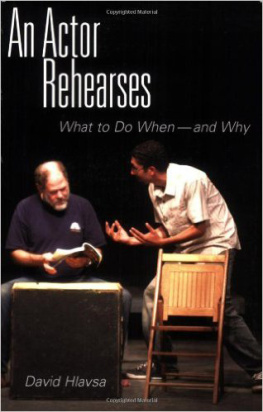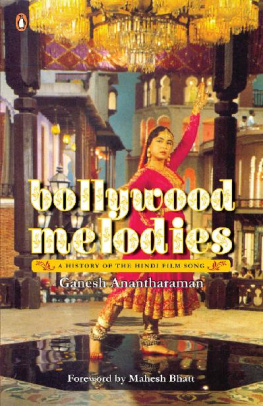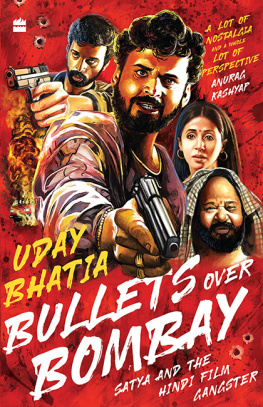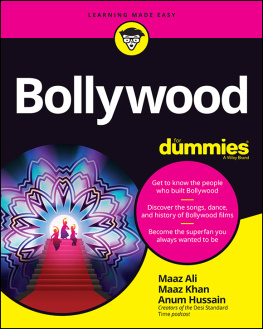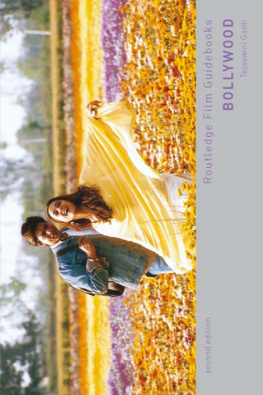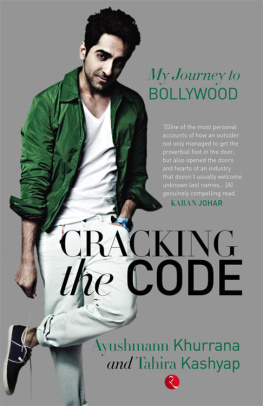Table of Contents
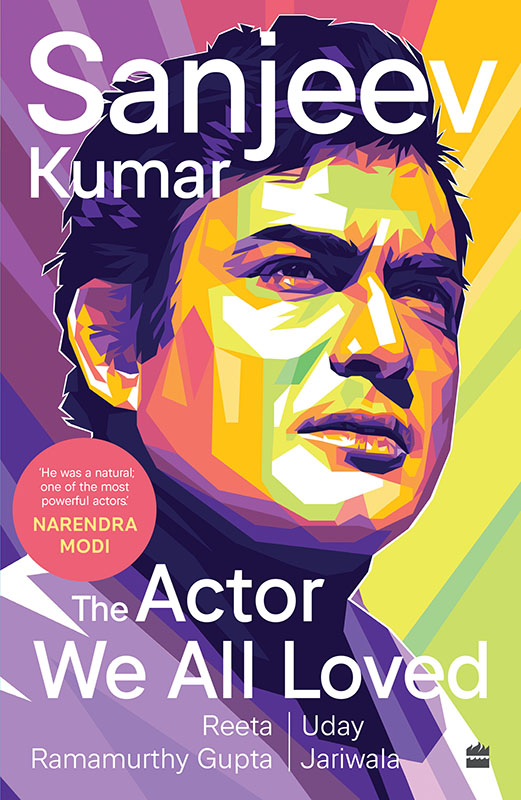

Every mans life ends the same way.
It is only the details of how he lived and how he died that distinguish one man from another.
Ernest Hemingway
For
Jyoti, Uday, Neelam, Aryan, Saachi, Prithvi, Rishika, Krishiv, Ekta, Fiahan, Ashish, Artee
and the late Jethalal, Shantaben, Kishore, Nikul, Gayatri, Ashok and Jamnadasji
Contents
An Ode to My Friend
Dont take my friend away, just yet,
his body is still warm
feels alive.
Dont take him away, just yet.
Hes perhaps at unease
Let him say his piece
His hopes are alive
His sorrows still hurt!
Dont take him away, just yet.
Shake him up, will you;
I havent bid him a proper goodbye.
How can he be so still!
when the wounds of life still hurt
Dont take him away, just yet.
Gulzar
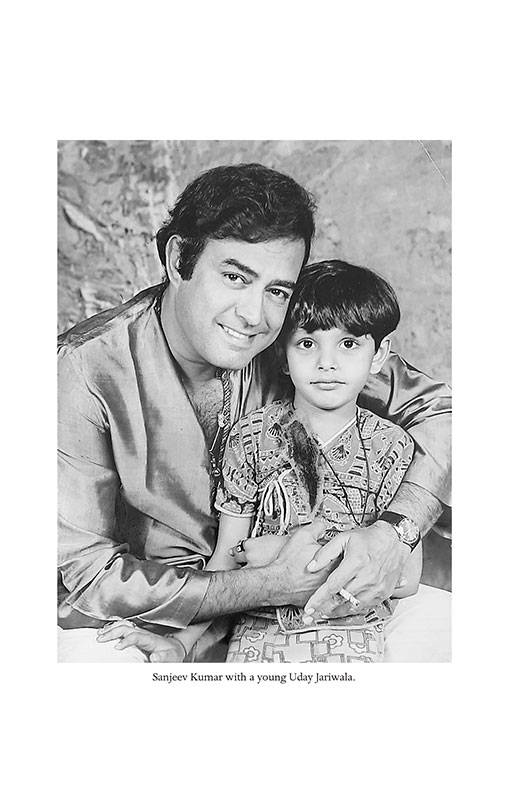

W hen the Almighty decided to bless Hindi cinema with largesse, he sent Haribhai Jariwala to earth. A parasmani who could deliver a stellar performance even in a simple role or convert an ordinary dialogue into an auditory odyssey, Haribhai Jariwala was a performer nonpareil. I am always humbled when spoken of in the same breath as Haribhai, courtesy our work and our home state of Gujarat. Our journey from theatre to cinema is also a common thread that connects our career paths.
My experiments with theatre started in the early 1970s. Haribhai, a superstar at the time, came to see my play Kabro (based on the English play Equus) at Bhaidas Hall in Mumbai. This must have been around 1979. On another occasion, he came to see one of my plays at Prithvi Theatre. He had mentioned then that he was staying in the same complex at a friends home. I remember this distinctly because shortly afterwards he suffered a heart attack and I went to see him at Nanavati Hospital. This was in 1983.
However, the last time I saw him was at a shoot in Mumbais Film City in 1985. He was doing Nitin Manmohans film Baat Ban Jaaye. He had just returned from his cardiac surgery in the United States. I went over from my set to his to pay my respects. What I saw was a blanched apparition of the happy man I had seen before! In all fairness, I had only known him as a big starso he wasnt particularly accessible to or communicative with me. But thanks to a few common friends, like actors Amrit Patel and Chandrakant Thakkar and producer Jayant Malkan (who had produced his film Namkeen), he was always polite and courteous to me. I will never forget what I saw on the set that day. But when the camera turned on, Haribhai resurrected himself into the character he was playing.
Theatre is an excellent training ground, and Haribhai was already a thespian when he sought roles in cinema. Theatre requires exceptional memory. There are no short takes that can be patched together. It is an actors medium, and the performance is organic and live. Once the curtains open, the actors have to hold the audience and assay the plot. Theatre gives you confidence and instils discipline and alertness. The subjects theatre deals in are also intense; the literature is fine and the writing is exceptional. You mature as an artiste around sensitive subjects. But heres the key: theatre prepares you for a marathon, whereas cinema is a 50-metre run. Haribhai understood this intuitively.
In cinema, theatricality is not considered good, so you have to adjust your sense of proportion and become more subtle, temper your loudness and your tonality. Moreover, cinema is a directors medium. An actor is just doing his or her part and may not even know what else is being shot where for the film. The movie comes together only in the directors mind and, hence, overconfidence can kill you. Haribhai knew exactly how much to act. That is not easy!
In the initial days of his career, he was extremely good lookingas charming as Cary Grant and as timeless as Dilip sahab. Directors noticed him because you couldnt take your eyes off him. He used his voice exceptionally well. He didnt have the baritone of Amitabh Bachchan, but he was extremely intelligent and knew what to do with his voice. He was a powerful actor; he owned the screen when he was on it. His performances in Aandhi, Koshish and Anubhav are a course in acting itself. And what a terrific exponent of comedy he was in films like Angoor and Pati Patni Aur Woh!
For all great character artistes, the bulk of earnings and recall come from the big multi-starrers they feature in. For Haribhai, these were films like Trishul, Sholay, etc. Jamnadasji, Haribhais manager, used to tell me, Paresh, agar Amitabh Bachchan ka baap banna hai to Sanjeev Kumar hi ban sakta hai! Aur kaun banega? (Who but Sanjeev Kumar can match Amitabh Bachchan on the screen?)
Haribhai was pensive and observant in nature. While he never craved glamour, he was a gifted exponent of the art of make-up. The film Naya Din Nayi Raat is a case in point. During an early chance encounter, I had seen him reading a book by Richard Emerson Smiththe American special make-up-effects artiste, nicknamed Godfather of make-up. His own make-up artiste, Sarosh Mody, was trained abroad and was an absolute genius. Haribhai had the ideal actors facethere was a lot of space for expression and it had an excellent sense of proportion. His face was also very versatilehe could pull off expressions for any emotion, any character without looking awkward. He also knew how to keep it real. I can say with certainty that Haribhais loose kurta pyjama and ruffled hair were not the result of carelessness. Thats how people dress when theyre at home, and he was playing a part!
I remember that the late Satyen Kappu used to reminisce about Haribhai a lot. Uske jaisa kaun risk leta hai?, he would constantly say. The audience used to sigh with relief when Haribhai entered the frame, Nothing can go wrong now! He was every directors fail-safe artiste, an avatar all in his own league to perform and enthral. His performances will be studied by generations and in perpetuity.
I would love to reprise Koshish some day! Maybe in my own way and maybe as a tribute to Haribhai. His performance in that film was not just about playing a character with disability; his touching portrayal elicited a response from everyone in the audience. What greater paean can I write for Haribhai?
Paresh Rawal

T here are two distinct elements to being a great actorone is the ability to play a variety of roles and the other is the audiences willingness to accept the actor in those roles. Audiences often reject their favourite stars when they digress too far from their star avatar. Haribhai stands tallin a category all his ownbecause his audience was convinced that he could play anything. His work is a testimony to that.
As a director, I can vouch for the fact that in the history of world cinema, there are very few who can transcend this dreaded slotting! Haribhai never played the characterhe became the character. To be fair to actors, this rigorous typecasting is often a function of the industry itself making a commercial judgement of them. It is not uncommon for producers to slot an actor in terms of Can he romance the heroine?, Can he dance?, Can he fight?, Can he do comedy? Haribhai was beyond these boundaries. In fact, he had created a space for himself where the audience expected him to be different and enjoyed the infinite talent he displayed. He was comfortable with the thought of interpreting a character in his own unique way and did not want to play it according to someone elses idea of it. I am sure if he was ever asked the question, Can you perform the role?Haribhai would have replied with a twinkle in his eyes and a smile, Lets give it a shot!



